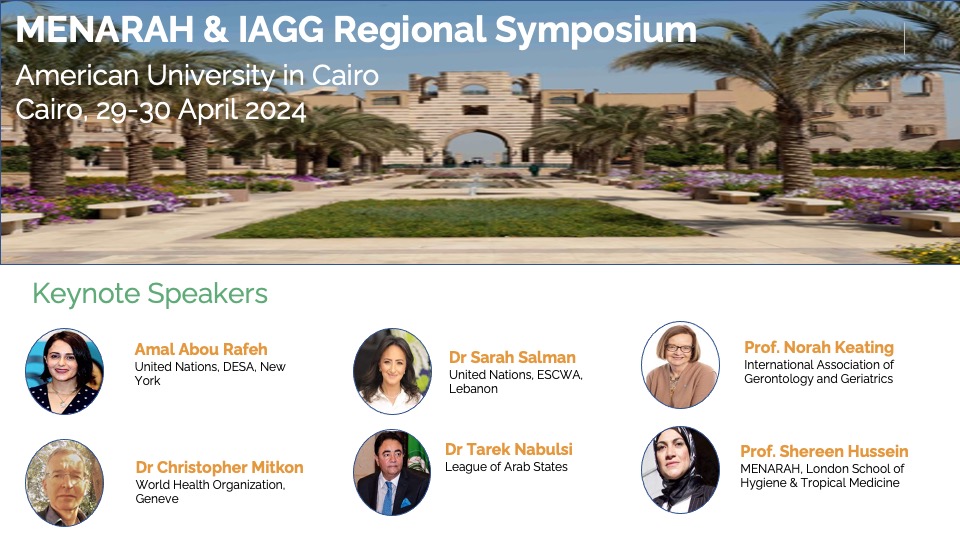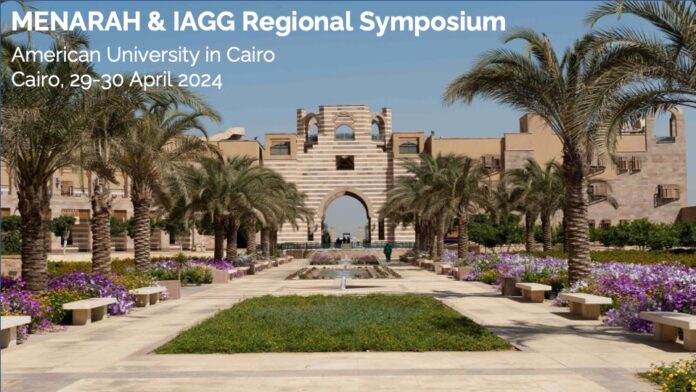EMPOWERING FUTURES: Shaping a Dignified Long-Term Care Ecosystem for Healthy Ageing and Well-being of Carers and Older Persons in the Middle East and North Africa
🌍 A Joint MENARHA and International Association of Gerontology and Geriatrics Regional Symposium hosted by the American University in Cairo
You are invited to attend a regional symposium, in-person or online.
We have limited in-person places, so please register your interest, and we will contact you to confirm availability.
📅 Date: Monday-Tuesday, 29th-30th April 2024 (09:00 to 16:00 Cairo time)
📍 Location: American University in Cairo, AUC Ave, New Cairo 1, Cairo Governorate 11835, Egypt
🔗 Zoom Link: To Be Confirmed
See our full Programme
MENARAH-IAGG-Symposium-FINALProgrammeThe Middle East and North Africa Research on Healthy Ageing (MENARHA) Network, in collaboration with the International Association of Gerontology and Geriatrics (IAGG), extends a warm invitation to you for a remarkable event aimed at shaping the future of healthy ageing in our region. The symposium welcomes contributions from prominent global and regional speakers, with representations from the United Nations, the World Health Organization, the League of Arab States and several regional non-governmental organisations and research groups.

Background
The MENA region stands at the threshold of unprecedented demographic changes, marked by rapid population ageing. It’s time to come together to address the challenges and opportunities ahead.
Population ageing in the MENA region is accelerating, necessitating proactive measures at policy and practice levels. While longevity is a cause for celebration, increased life expectancy doesn’t always equate to increased healthy life expectancy. Accessible, equitable, and sustainable long-term care (LTC) services are urgently needed.
The care ecosystem refers to the intricate network of formal and informal entities, including healthcare systems, social services, families, communities, and informal caregivers, collectively supporting and assisting individuals needing long-term care, particularly older people. In the MENA region, families and informal care play a pivotal role in the care ecosystem for older individuals.
Preferences in LTC remain rooted in care at home, where the family remains a core component of the care ecosystem. Yet changing family dynamics, rapid urbanisation, and mobility patterns threaten the sustainability of the informal care sector, highlighting the urgency for strategic policy and community interventions that ensure good care while creating decent work for carers. The UN Decade of Healthy Ageing (2021-2030) underscores the urgency of the care crisis, asking country members to take action by strengthening the LTC ecosystem, including providing access to long-term care for older people. Notably, this action states that families should not be responsible for care.
Recognising the gendered nature of caregiving is crucial. Improving the LTC market and economy in the Middle East can alleviate the care burden on women, often referred to as the ‘sandwich generation,’ who balance caregiving responsibilities for both older and younger family members. By bolstering the LTC sector, we can enhance opportunities for women to sustain their labour force participation, reducing their exclusion from financial well-being. Through regulated and adequate LTC provision, the quality of life for older individuals and their families can significantly improve, ensuring dignified and high-quality care for older people while promoting familial and societal well-being.
Understanding People, Place, and Policy intersections is pivotal in developing sustainable LTC economies in the Middle East. Recognising the diversity among older adults and their interactions with familial, community, and policy environments is essential for ensuring well-being. Strengthening LTC markets within these contexts is an urgent step toward addressing the demands of an ageing population while fostering inclusive, dignified, and person-centred care.
Why Attend?
✨ Engage: Participate in thought-provoking discussions on policy and practice to enhance gender equity and the quality of life of older people, informal carers, and paid care workers.
🌱 Empower: Discover innovative approaches and societal strategies to strengthen the LTC ecosystem in our region.
🌐 Connect: Network with esteemed professionals, researchers, and advocates in the ageing and long-term care fields.
📊 Impact: Contribute to shaping sustainable LTC markets and supporting informal carers in the MENA region.
Expected Outcomes:
📢 Increase awareness of rapid demographic shifts and the importance of developing well-structured LTC markets.
🤝 Foster discussions on policy and practice to enhance the well-being of older persons and carers.
📝 Recommend actionable policy and practice development steps to strengthen the LTC ecosystem.
As we navigate the complexities of population ageing, let us unite our expertise, insights, and passion to pave the way for a brighter, more inclusive future for all.
You are invited to attend a regional symposium, in-person or online.
We have limited in-person places, so please register your interest.
Founder and Director
Shereen Husseinis a Health and Social Care Policy professor at the London School of Hygiene and Tropical Medicine (LSHTM), United Kingdom.
Shereen Founded the MENARAH Network in 2019, through an initial grant from the Global Challenge Research Fund, UKRI. She is a medical demographer with expertise in ageing, family dynamics, migration and long-term care systems. Shereen regularly collaborates with the United Nations, the World Health Organisation and the World Bank in policy and research focused on ageing in the Middle East and North Africa Region.
Shereen received her undergraduate degree in statistics and a postgraduate degree in computer science at Cairo University. She completed an MSc in medical demography at the London School of Hygiene and a PhD in quantitative demography and population studies at the London School of Economics and Political Science, United Kingdom.






